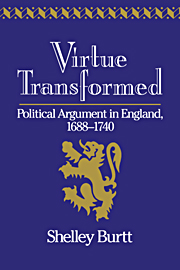Book contents
- Frontmatter
- Contents
- Acknowledgements
- 1 Introduction
- 2 The politics of virtue in Augustan England
- 3 A religious politics of virtue: Low Church Anglicanism and the Societies for Reformation of Manners
- 4 A republican politics of virtue: The selfish citizen in Cato's Letters
- 5 Bolingbroke's politics of virtue
- 6 The Court Whig conception of civic virtue
- 7 A world without virtue: Mandeville's social and political thought
- 8 Virtue transformed
- Bibliography
- Index
3 - A religious politics of virtue: Low Church Anglicanism and the Societies for Reformation of Manners
Published online by Cambridge University Press: 24 October 2009
- Frontmatter
- Contents
- Acknowledgements
- 1 Introduction
- 2 The politics of virtue in Augustan England
- 3 A religious politics of virtue: Low Church Anglicanism and the Societies for Reformation of Manners
- 4 A republican politics of virtue: The selfish citizen in Cato's Letters
- 5 Bolingbroke's politics of virtue
- 6 The Court Whig conception of civic virtue
- 7 A world without virtue: Mandeville's social and political thought
- 8 Virtue transformed
- Bibliography
- Index
Summary
In the previous chapter, I made the point that not all politics of virtue in the early eighteenth century were republican. To borrow the words of J. C. D. Clark, not all those concerned with the nature and possibility of the good citizen “spoke with a ‘humanist and Machiavellian vocabulary’ after 1688 [in which]… politics increasingly revolved around secular concepts of credit and commerce, virtue and corruption.” Equally, if not more, important to the politics of the day were the various religious understandings of political virtue, articulated in the sermons, tracts and polemical literature of the decades following the Glorious Revolution.
Anglican clerics and dissenting ministers considered themselves not only qualified but obligated to pronounce upon the dispositions that made an individual a good citizen – forays into the political realm made even more controversial by their efforts to enforce these notions in the nation's laws. Although modern scholars have provided us with political histories of the occasional conformity debate, the Test and Corporation Acts dispute and the national movement for reformation of manners, none has explictly considered these political initiatives in the context of the debate about public virtue. Yet to Augustan citizens, the Church's competing accounts of the good citizen loomed just as large, if not larger, than the classical republican or civic humanist account put forward most articulately by writers in the Country tradition.
Anglican theology of the Augustan era actually offered two distinct conceptions of the good citizen to the eighteenth-century public, alternatives which paralleled the division between the conservative High Church Anglicans and their more moderate, Low Church brethren.
- Type
- Chapter
- Information
- Virtue TransformedPolitical Argument in England, 1688–1740, pp. 39 - 63Publisher: Cambridge University PressPrint publication year: 1992



